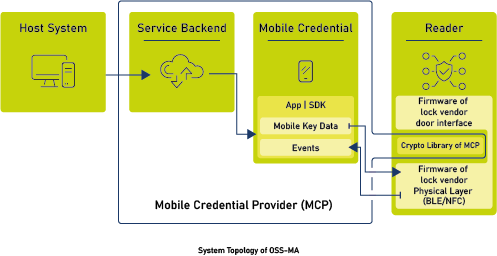The smartphone as a door opener
Smartphones have long been part of everyday life. With the development of the Mobile Access by OSS standard, mobile devices can now also be used as a key (mobile credential).
The providers of the access control systems send a digital key to the user with a click. The users in turn download their mobile access app and open the electronic door lock with their smartphone.
This eliminates the need for personal and personnel-intensive key handovers. Mobile credential providers (MCPs) ensure the security of the data in the cloud and on the smartphone.
Security can furthermore be enhanced by multi-factor authentication functions such as biometrics (facial recognition / fingerprint) and/or a PIN code, which are integrated in the Access app.
The mobile app for smartphones is uniquely assigned to each user by the MCP, which can be done in different ways depending on the MCP. User credentials can be based on existing IDs (e.g. Google, Apple, Microsoft), as well as on telephone numbers or single-use transport tokens. In the host system, each smartphone credential is managed via a unique credential ID in the same way as RFID cardsused in parallel.
Authentication / data transmission between the smartphone and the lock takes place via Bluetooth Low Energy (BLE) or Near Field Communication (NFC), so that the door can only be opened if the holder of the mobile ID card is physically at or near the door.
Mobile Access – time and cost efficient
Phasing out badges, ID cards or coded key cards will eventually eliminate both personnel and production costs for these items.
By eliminating the need for badges, companies can save time and money by having employees and visitors use their smartphones as IDs. After all, managing access cards is labour- and time-intensive, and there are high costs for producing andissuing more and more badges, cards and secure IDs, Because the management of access cards is personnel and time-intensive, high costs arise for the production and above all the issuing of new badges, cards and secure ID cards,
Above all, the effort required to block lost credentials can be massively reduced with Mobile Credentials at the “click of a mouse”.
Mobile access – can be used flexibly
The Mobile Access Credential Provider (MCP) is a provider whose technology allows digital keys to be sent to and securely used on mobile devices such as smartphones or tablets to gain access to physical or virtual resources. The MCP uses secure protocols to send users appropriate authorizations based on their digital identities. This technology can in principle be applied for different uses, such as:
- Access control to buildings, rooms or vehicles
- Authentication for online services or cloud applications
- Participation in events or surveys
The advantages
Mobile access offers several advantages over traditional methods of access control, such as:
- Significantly reduced administrative effort when issuing or withdrawing authorizations compared to physical tokens or cards
- Increased productivity through the ability to integrate seamlessly with enterprise software such as Active Directory or industry-specific software like co-working platforms, flat management and more.
- Greater user-friendliness through simple handling, personalised settings
- Higher security through encryption, biometrics and multi-factor authentication
- Greater flexibility through adaptation to different scenarios, devices and platforms
- Higher efficiency through reduction of time and resources
In the coming years, a significant increase in application possibilities with the Mobile Access Standard can be expected. This groundbreaking technology offers companies the advantages of remarkable increases in productivity and cost savings. As a result of using standards, dependence on otherwise proprietary systems is greatly reduced.
Furthermore, the increased security standard is of primary interest to the security industry.

Standard Mobile Access by OSS.
We will be happy to send you the specifications. Please fill out the form below.

